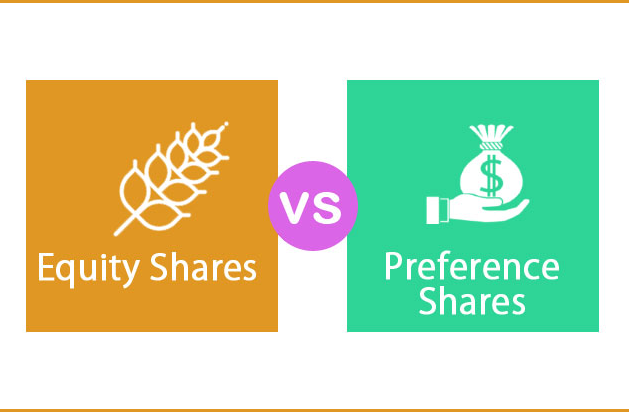


Equity Shares:-
Equity Shares are the main source of raising the funds for the firm. All equity shareholders are collectively owners of the company and they have the authority to control the affairs of the business. It is a form of partial or part Ownership in the company in which shareholders bear the highest business risk. Ownership in the company is depending on the % of shares they hold. Equity shares are also called as ordinary shares. A share is a unit of ownership in a company and has an exchangeable value that is influenced by market forces. As per Section 43 of the Companies Act, 2013, a company’s share capital is of two types of shares, namely – equity shares and preference shares. The Equity shareholders get the profit of the company in the form of dividend but the rate of dividend is not fixed as it fluctuates according to profits i.e. more profit: more dividend and vice versa.
These are like two sides of a coin as they have their own advantages and disadvantages. Dividend of equity is highly dependent on the performance of the company while dividends of preference shares is fixed.
Preference Shares: –
The capital that a company raises through the issuance of preference shares is termed as preference share capital.
Preference Shares, as the name suggests are the shares in which shareholders get the profit of the company in form of dividends before Equity shareholders at a fixed dividend rate. Money raised through the issue of preference shares is called preference share capital. Preference shareholders do not have the authority to control the affairs of the company. In case of company insolvency issues, Preference shareholders are paid first from company assets.
These shares come with a fixed rate of dividend and a preferential right to avail profits and claim assets during liquidation. In fact, these shares are ranked between debt and equity in terms of priority and repayment of capital. Like equity shares, preference shareholders are also partial owners of a company. However, they are not entitled to voting rights and hence do not really possess the power to control or influence company-oriented decisions.
Also, shareholders do not have a claim over the bonus shares and are a prominent preference shares and equity shares difference.
The decision to declare dividend on preference shares lies with the management, and it is not mandatory in case of loss. This is the most crucial difference between Equity Share and Preference Share.
Types of Preference Shares
The following are the major types of preference share –
It must be noted that dividends paid on preference shares are not deducted from taxes. Also, redeeming such shares creates a financial burden on the company and erodes its capital. Similarly, when profits are earned, companies must pay off the arrears dividends, especially in case of Cumulative Preference Shares.
Fundamental differences between Equity Share and Preference Share
The major point of difference between equity share and preference share pertains to voting rights and distribution of dividends.
Since in equity shares, there is high risk, therefore, the equity shareholders are the real bearer of the company because they have a residual share in the liquidation of the company. Whereas, in preference shares, the shareholders have a preference with respect to higher claims on earning and the dividend rate is fixed.
| Basis Of Difference | Equity Shares | Preference Shares |
| Definition | Equity share is the foundation of the company as it raises fund. These cannot be converted to preference shares. | Preference shares are the shares which promise the holder a preference over the equity shares. These can be converted to equity shares. |
| Dividend | Equity shares do not have right to receive dividend. | Under preference shares, based on time, cumulative or non-cumulative are entitled for the dividend. |
| Rate of Dividend | The rate of dividend is fluctuating. | The rate of dividend is fixed. |
| Voting rights | Voting rights under general/member’s meeting. | Do not have any voting rights as such.They enjoy the voting right only on such matters which directly affect the interest of preference shareholders. |
| Types of Shares | These are considered as ordinary shares and thus they do not have any types in specific. | These come in various types like: Convertible and non-convertible Cumulative and Cumulative and non –cumulative. |
| Liquidation | During liquidation, the shareholders will have residual right over the assets even after the repayment to preference shares of the company. | The shareholders will have first right after the repayment of debts. |
| Participation rights | They are primarily responsible for the management of the company. | Do not have any participation rights in the company’s management. |